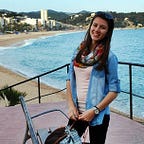New Year’s Bulgarian Banitsa with fortunes
Banitsa is the queen of the Bulgarian cuisine! It’s the traditional meal that everyone in the country knows and loves.
In New Year’s Eve dinner Banitsa is a must on the festive table. On that day we make it with some lucky charms or fortunes (small sheets of paper with written wishes). We put coins and sometimes a piece of dogwood branch with a bud which symbolize wealth. We put the fortunes in the pastry and then everyone in the house take a piece of the Banitsa and the lucky charm in it determines the upcoming year. There should be enough pieces of the meal for everyone in the house + 1 additional piece. It is called St. Mary. Part of the tradition is putting the dogwood pieces from the Banitsa in the burning fire. If they pop this means health and wealth.
Banitsa is made with homemade or commercially made pastry sheets that are prepared from a baker’s hard dough including flour, eggs, and water. You can find pastry sheets in every Bulgarian shop, just ask for “kori za Banitsa”. The filling is made of white cheese (“sirene”), yogurt and eggs. And, generally, that’s it!
Now, how to prepare it? Mix the products for the filling in separate bowl — eggs, white cheese and yogurt. Then take a large baking pan and put some oil on the bottom. Layer the pastry sheets individually one by one with small amounts of the filling between them.
Then hid the fortunes prepared in advance in different places in the Banitsa. You can roll the paper fortunes in kitchen foil so they can remain intact. After that the pastry is baked in an oven at 200 — 250 °C. You can also find New Year’s fortunes in almost every Bulgarian shop.
Now you know the secret of our traditional New Year’s Eve dinner! Don’t forget to share it with your friends and family!
Read more:
New Year’s Eve in Bulgaria — What we eat and what we do?
